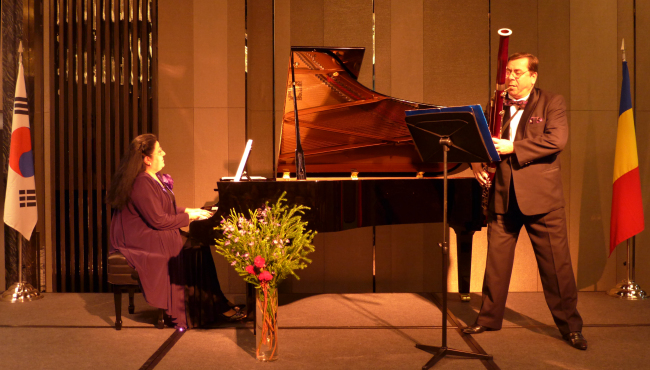The Romanian Embassy in Seoul let music speak the spirit of their national day celebration. The sound of music that filled the reception hall at JW Marriot Dongdaemun last Monday did more than words could do, striking a chord of freedom and unity with the guests.
“Anniversaries are opportunities for honoring happiness and recalling memories. It is also an occasion to validate the essence of our ideals,” Romanian Ambassador to Korea Calin Fabian said in an opening speech. “Anniversaries are of a special nature, for contemplating what has been left behind and prospecting our future challenges.”
The ambassador left the remainder of the evening to Romanian pianist Ilinca Dumitrescu and bassoonist Vasile Macovei, who played scores of Chopin, Saint-Saens, Porumbescu, Enescu and Popovici.
“Anniversaries are opportunities for honoring happiness and recalling memories. It is also an occasion to validate the essence of our ideals,” Romanian Ambassador to Korea Calin Fabian said in an opening speech. “Anniversaries are of a special nature, for contemplating what has been left behind and prospecting our future challenges.”
The ambassador left the remainder of the evening to Romanian pianist Ilinca Dumitrescu and bassoonist Vasile Macovei, who played scores of Chopin, Saint-Saens, Porumbescu, Enescu and Popovici.

The National Day of Romania, which is celebrated on December 1 every year, marks the union of Transylvanian province into modern Romanian state. On December 18, 1918, an assembly of ethnic delegates congregated in the city of Alba Iulia and decreed the “fundamental principles of the new Romanian state,” which were based on the values of local democratic autonomy and equality for all nationalities and religions.

“We also want to jubilate the strategic partnership between Romania and Korea. Twenty-five years after the 1989 Romanian Revolution, we will continue to rely on one another for mutual support and friendship,” Fabian added.
The Romanian Revolution in December 1989 paved the way for the country’s return to democracy and European values, ending 24 years of brutal communist rule under dictator Nicolae Ceausescu. More than 1,100 people died during the revolutionary bloodshed that erupted across the country over a week, before Ceausescu and his wife Elena were captured by the military, summarily tried and executed by a firing squad.
Romanian history was filled with rich layers of Roman, Ottoman, Austro-Hungarian imperial legacies before the communists took power, Fabian said in an interview with The Korea Herald at the embassy in Seoul. “Erasing and rewriting our original heritage was the first grand project of the communist regime, which sought to replace it with a totalitarian, linear narrative of socialist progress and victory,” he added.
Fabian said that Romania, which suffered from the most authoritarian form of communist rule, went onto a wholesale embrace of western liberal values and neoliberal economic policies. “We had to negate our downtrodden past to the same degree that our people’s heritage was appropriated and abused by Ceausescu.”
However, filling the vacuum of communist legacy with the “new system of fair competition” was neither possible nor desirable, Fabian stressed. “When I was a geology professor at the University of Bucharest, one of the first things the faculty decided to do was lay off all staff and rehire them, to start clean without communist vestiges. But we quickly realized that this was impossible, as the people under the old system had all the means and knowledge of education.”
Fabian emphasized that healing the society’s wounds and reestablishing institutions based on democratic values has been a long and agonizing process. The executive, judiciary and legislative powers of the state which were coalesced by the “cult of personality” surrounding Ceausescu had to be disembodied to establish checks and balances.
“Even our darkest days are part of our everyday consciousness after all these years. The key was not to resort to extremism on either side, but to tread the middle ground through compromise and understanding,” the ambassador noted.
By Joel Lee (joel@heraldcorp.com)
-
Articles by Korea Herald




![[Herald Interview] 'Amid aging population, Korea to invite more young professionals from overseas'](http://res.heraldm.com/phpwas/restmb_idxmake.php?idx=644&simg=/content/image/2024/04/24/20240424050844_0.jpg&u=20240424200058)












![[KH Explains] Korean shipbuilding stocks rally: Real growth or bubble?](http://res.heraldm.com/phpwas/restmb_idxmake.php?idx=652&simg=/content/image/2024/04/25/20240425050656_0.jpg&u=)

